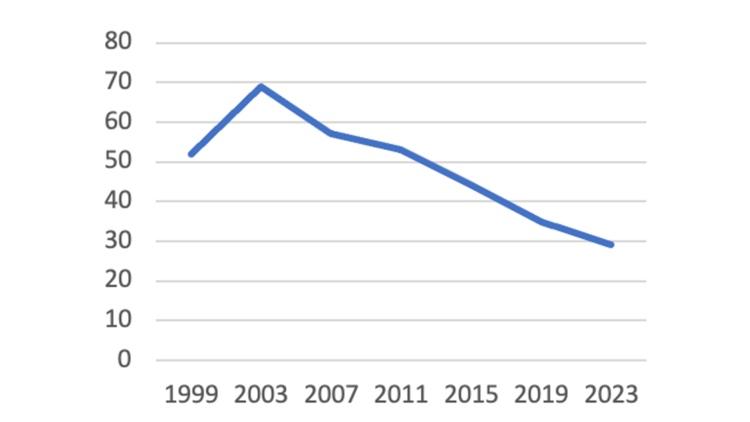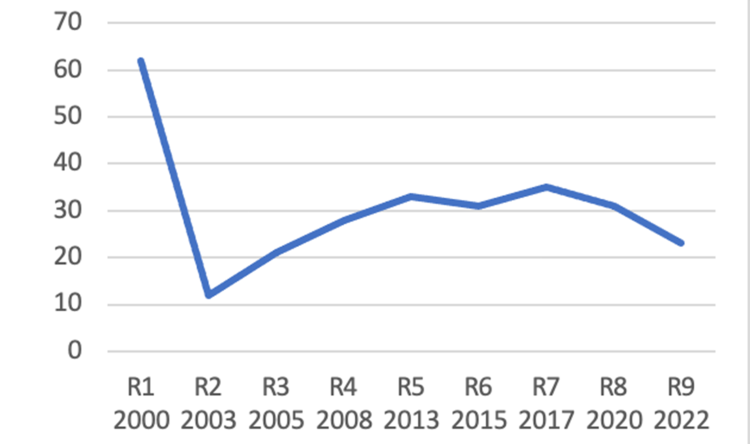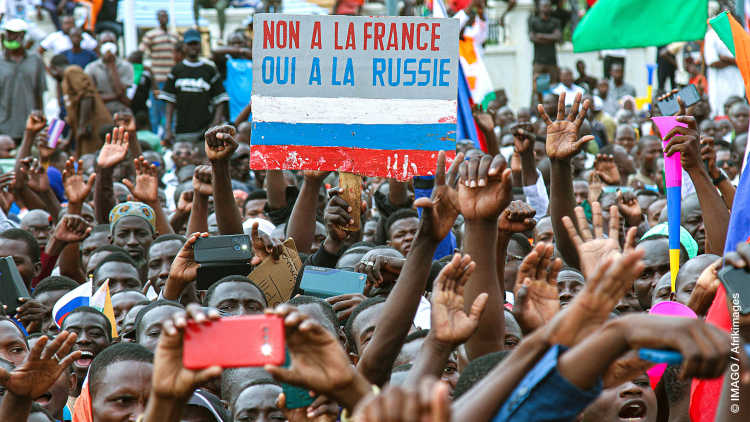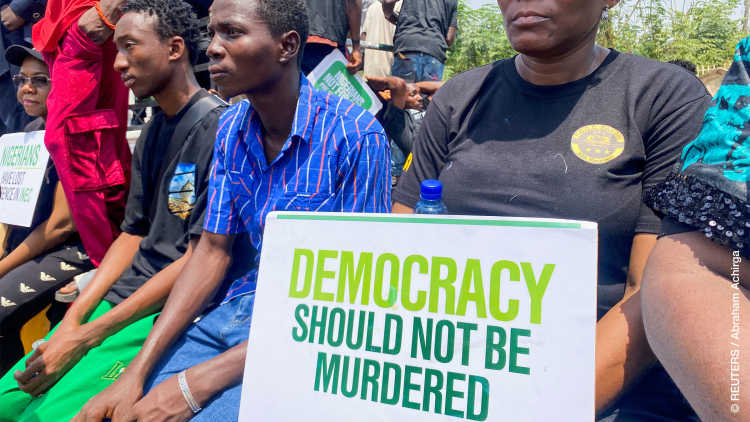- Home
- Publications
- GIGA Focus
- Overpromising and Underdelivering? Digital Technology in Nigeria’s 2023 Presidential Elections
GIGA Focus Africa
Overpromising and Underdelivering? Digital Technology in Nigeria’s 2023 Presidential Elections
Number 2 | 2023 | ISSN: 1862-3603

Africa reportedly exhibits lower overall levels of electoral integrity compared to other world regions. Remedying this situation has occasioned an explosion in the adoption of election technology. In 2023, Nigeria joined the wave of election digitalisation by holding its most technologically advanced polls since the inception of the Fourth Republic. But evidence from the elections contradicts the much-touted credibility guarantees that such technology comes with.
Previous elections in Nigeria have witnessed a consistent decline in voter participation. Turnout in the just-ended 2023 presidential elections was a paltry 29 per cent, down from 69 per cent in 2003 and 53 per cent in 2011.
Popular distrust in the electoral process generally, and in the Independent National Electoral Commission (INEC) particularly, has seen voter apathy in recent elections reach record levels.
To salvage this situation, Nigeria has adopted digital technology to, among other things, enhance transparency and integrity in the electoral process and boost popular confidence in the INEC. Digital technology is expected to guarantee a credible electoral roll and bring some robustness to voter-accreditation processes, while simultaneously enabling public access to results in real time.
However, the technology deployed in the 2023 elections proved to be insufficient in resolving these credibility deficits. Aside from the multiple technical challenges that bedevilled the technology in the course of these elections, voter turnout was the lowest in the history of the Fourth Republic and popular trust in the electoral process and the INEC does not seem salvageable in the short term.
Policy Implications
Ensuring that digital technologies guarantee credible elections in sub-Saharan Africa requires governments, democracy promoters, civil society groups, and international organisations prioritise election cybersecurity, build up local technical capacities, and focus on Election Management Bodies becoming more transparent, especially regarding the use of such technology.
Elections in Nigeria: The Question of Popular Trust and Voter Apathy
Africa’s largest democracy, Nigeria, reached another milestone by holding its seventh presidential elections on 25 February 2023. Four days after the polls, at dawn on 1 March, the chairperson of the Independent National Electoral Commission (INEC) declared Asiwaju Bola Ahmed Tinubu of the ruling All Progressives Congress the president-elect of the Federal Republic of Nigeria. Tinubu won with the backing of less than nine million voters out of the total 93 million registered, allowing him to rule a country of more than 220 million people. This result reflects the alarming levels of voter apathy in the country. To be sure, voter turnout has consistently declined since the 2003 presidential elections. In the last four elections, for instance, turnout has continuously declined: from 54 per cent in 2011 to 44 per cent in 2015 and then down to 35 per cent in 2019. The 2023 elections not only produced an abysmal 29 per cent turnout, but also the lowest since the inception of the country’s Fourth Republic (see Figure 1).
Figure 1. Voter Turnout in Nigeria during the Fourth Republic (%)

Source: The INEC (1999–2023).
Voter apathy in Nigeria may have two interrelated causes. First, the increasing popular distrust in the electoral process generally and, second, in the country’s Election Management Body (EMB) specifically. Afrobarometer surveys suggest that about 7 out of 10 Nigerians do not believe that their views are reflected in elections while an additional 77 per cent do not believe that the latter provide an avenue for leaders to be removed from office (Afrobarometer 2022). These sentiments are not without basis given the array of electoral malpractices (such as rigging, vote-buying, violence, and ballot-box snatching) that have continually riddled and undermined the legitimacy of the country’s electoral process. As shown in Figure 2 below, in the run up to the 2023 elections less than one-quarter of Nigerians trusted the INEC “somewhat” or “a lot.” Waning trust in the electoral process and in the INEC somewhat correlates with the reduced voter turnout seen over the last two decades.
Figure 2. Trust in the INEC during the Fourth Republic – “somewhat” / “a lot” (%)

Source: Afrobarometer Rounds 1–9 (2000–2022).
The Search for Electoral Integrity in “Technology”
In the lead up to the 2023 elections, the INEC announced far-reaching measures to enhance its own integrity and consequently restore popular confidence in the electoral process. One such measure was the heavy investment in digital technology. In several press briefings, the INEC justified the procurement of this new technology – highlighting not only its transparency-enhancing potentials but also its ability to inspire public trust in the electoral outcome. The chairperson of the INEC argued specifically that the new technology will deliver “free, fair, credible and verifiable elections supported by technology which guarantees transparent accreditation and upload of polling unit results for citizens to view in real-time on election day” (Suleiman 2022). The INEC further claimed that with the new technology, such pervasive weaknesses in the Nigerian electoral process as the falsification of votes at polling units, of numbers of accredited voters, and of collated results will become things of the past. Additionally, digital technology would address issues of computational errors, the forging or swapping of result sheets, and poor record-keeping (Itodo 2022).
The Bimodal Voter Accreditation System and the INEC Result Viewing Portal
The 2023 election technology was composed of two complementary innovations: the Bimodal Voters Accreditation System (BVAS) and the INEC Result Viewing Portal (IReV). The BVAS is a portable technological device that digitally reads the fingerprints of those turning up at a polling unit, thus helping with voter authentication and accreditation. It also has facial-recognition functions that can read and analyse the features of voters and compare them with the INEC’s database of stored images to identify and verify a person prior to them casting their vote.
The device is also equipped with a camera function to capture the raw results sheets from the polling units for transmission to the INEC’s collation centre. These raw images are then uploaded to the IReV. This is an online portal that gives the general public real-time access to the results captured and transmitted from the polling units. A user account needs to have been created by the viewing member of public before access is granted to all the uploaded results from the country’s various polling units in PDF format.
The Bigger Picture: Movement towards Using Digital Technology in African Elections
The adoption of digital technology for election management is not peculiar to Nigeria. The past decade has seen a considerable drive towards the utilisation of technological tools and solutions to improve electoral processes and outcomes across sub-Saharan Africa. Today, almost all elections in the region deploy one form of digital technology or the other. This ranges from established democracies like Ghana utilising biometric technology for voter registration and verification to consolidating ones like Kenya digitally releasing raw polling-station results in real time (Crawford 2022).
There are good, almost universally touted, reasons for the growing popularity of digital technology in sub-Saharan Africa. It has often been argued that such technology is a key guarantor of electoral credibility, transparency, and integrity. The burgeoning literature on the digitalisation of African elections often treats this technology as a “forensic measure” that can be deployed in the face of the multiple irregularities and flaws that characterise elections in the region – especially voter impersonation and election-rigging (Debrah, Effah, and Owusu-Mensah 2018; Nwagwu 2016). Others point to the effects of digital technology not only on voter turnout but also overall popular trust in democracy itself (Achieng and Ruhode 2013; Debrah, Effah, and Owusu-Mensah 2018).
But while it is true that digital technology may ensure greater efficiency in the management of elections and enhance overall popular trust in the electoral process, it is also the case that it may be susceptible to newer forms of vulnerabilities and disruptive attacks too. Additionally, technical hitches may arise that could equally compromise the credibility of the electoral process and undermine public confidence in democracy. This is what the 2023 presidential elections in Nigeria would exemplify.
Election Day Fiasco: The BVAS Fails to Live Up to Expectations
It did not take long after the opening of polls on election day for observers to spot difficulties with the BVAS. Polling unit officers begun to struggle with the voter-accreditation process based on using the latter. Apparently, there was a complete underestimation of the time required to authenticate voters – causing delays that eventually disenfranchised many people (Hoffmann 2023; Oladeji 2023). Neither voters nor election observers could have anticipated this failure before the elections. This is because the INEC had, in the run up to election day, conducted mock voter-accreditation exercises at designated polling units across the country’s 36 states using the BVAS and enthralled journalists at numerous press conferences with elaborate explanations on their preparedness. The INEC had also previously deployed the technology in a few state-governorship elections and painted a highly optimistic picture of the technology’s performance level.
However, rolling out the BVAS on a larger scale on election day itself presented newer, unanticipated technical challenges that neither the INEC nor voters were prepared for. The mock trials that had been conducted at only 12 polling units per state and were adjudged to have produced high degrees of satisfaction, according to the EMB, were thus only premature celebrations – ones that would not survive real election-day pressures. Closely related to these voter-accreditation delays was the widespread breakdown of the BVAS on the day in question itself. Several reports from polling units across the country indicated that the BVAS failed to either function – such as in Borno State – or suffered sporadic glitches – as in Lagos State. Meanwhile in River State, for instance, there were reports that the BVAS failed to capture the biometric details of several individuals, including the governor, while identical twins failed to be validated as voters (Akeaya-inne 2023). Similar occurrences were reported in several other parts of the country, too (Akinlotan 2022). The Punch newspaper, for instance, reported that in some polling units, INEC officials brought the wrong BVAS devices and in the process disenfranchised many would-be voters.
Password Errors, Weak Internet Connectivity, and Failing to Be Used Offline: The IReV Hitch
The IReV is designed to kick into action immediately after voting ends. Polling unit ballots are first sorted, counted, and endorsed by an INEC officer. The BVAS device’s camera function is then activated to capture the raw result sheets, for transmission to a result-viewing portal in real time. This supposedly seamless process was, however, marred by controversies that tainted the transmission process. At the end of voting, many INEC officials claimed not to remember their passwords to the IReV portal (Akeaya-inne 2023). For those who could recollect theirs, many complained the passwords were wrong and that they could consequently not upload the polling unit results in real time (Unini 2023). While these cases might have been genuinely born out of a lack of proper training for the ad hoc staff responsible for operating the BVAS, the possibility of deliberate sabotage of the elections’ outcome by INEC officials cannot be ruled out (Akeaya-inne 2023).
Then the issue of the delayed transmission of results to the INEC’s portal arose. In a report by the Premium Times newspaper, even 24 hours after voting had closed results from a number of polling units had yet to be uploaded (Suleiman 2022). The INEC attributed this time lapse to the routine glitches common to technical platforms like the IReV. However, election-monitoring groups like the European Union Observer Mission (EOM) reported that the option to use the BVAS offline, enabling results sheets to be uploaded even in situations of weak Internet connectivity, simply failed to function or remained largely unused by those responsible.
Additionally, the EOM reported that scans of the presidential results from several parts of the country failed to upload to the portal. At the close of polls, therefore, the INEC portal had failed to disclose the results obtained from all of the country’s total 176,000 polling units as expected. In reality, only a handful of scanned election results were available for viewing online. This failure heavily undermined the transparency guarantee regarding the IReV that the INEC had so consistently advertised prior to election day.
Election Technology: The Real Game Changer?
Adopting digital technology in the management of elections could improve the functioning of EMBs and make their processes more robust and efficient. Doing so, most importantly, could help stem electoral manipulation and improve overall transparency (Cheeseman, Lynch, and Willis 2018). For one, the INEC’s biometric technology proved efficient in preventing the recurrence of bloated voter figures based on ghost and ineligible names, thus limiting opportunities for impersonation and vote-rigging. With the biometric system embedded in the BVAS, voter fraud and instances of people casting their ballot multiple times could be kept in check. To this extent, digital technology can be said to have improved the INEC’s efficiency in the organisation of Nigeria’s 2023 presidential elections.
However, despite these guarantees, actual implementation on election day was grossly ineffective and served to undermine the credibility of the electoral process and its outcome. As mentioned, the INEC deployed two highly robust technologies in the BVAS and the IReV – but both tools were applied in such a manner that they failed to eliminate or even significantly limit human interference in the electoral process. A number of BVAS devices were recorded as having broken down or outright malfunctioned across the country. There are lingering concerns that many of these incidences were either deliberate sabotage or at least provided the opportunity for electoral manipulation.
The future of African elections is undoubtedly digital. Investment in digital technology here is, therefore, key for emerging democracies. However, the adoption of it brings in new potential vulnerabilities like hacking, technical hitches, and the total breakdown of relevant devices. These challenges are exacerbated by old contextual problems like corruption and limited access to electricity and the Internet. To ensure that digital technologies guarantee credible elections in sub-Saharan Africa, governments, democracy promoters, civil society groups, and international organisations should prioritise cybersecurity, build up local technical capacities, and focus on EMBs becoming more transparent going forwards.
Footnotes
References
Achieng, Mourine, and Ephias Ruhode (2013), The Adoption and Challenges of Electronic Voting Technologies within the South African Context, in: International Journal of Managing Information Technology, 5, 4, 1–12.
Afrobarometer (2022), Preference for Democracy Remains High in Nigeria, But Dissatisfaction with Its Quality is Growing, accessed 30 March 2023.
Akeaya-inne, Adaze (2023), High Tech Failed to Make Nigeria’s Presidential Election Transparent, accessed 19 March 2023.
Akinlotan, Olasunkanmi (2022), Osoba, Three Others Disenfranchised Over BVAS Glitch, accessed 13 March 2023.
Cheeseman, Nic, Gabrielle Lynch, and Justin Willis (2018), Digital Dilemmas: The Unintended Consequences of Election Technology, in: Democratisation, 25, 8, 1397–1418.
Crawford, Andrew (2022), Paper Ballots with Digital Transparency: Kenya’s Pioneering Election, GIGA Focus Africa, 7, accessed 9 March 2023.
Debrah, Emmanuel, John Effah, and Isaac Owusu-Mensah (2018), Does the Use of a Biometric System Guarantee an Acceptable Election’s Outcome? Evidence from Ghana’s 2012 Election, in: African Studies, 28, 3, 1–23.
Hoffmann, Leena Koni (2023), Nigeria’s Elections Put Disenfranchisement in the Spotlight, Chatham House, 9 March 2023.
Itodo, Samson (2022), Inspiring Confidence in the BVAS and Electronic Transmission of Election Results: Seven Urgent Actions for INEC, accessed 12 March 2023.
Nwagwu, Jombo (2016), Information and Communication Technology and Administration of 2015 General Election in Nigeria, in: Mediterranean Journal of Social Sciences, 7, 4, 303–316.
Oladeji, Mayowa (2023), Analysis: Fallout from Presidential Election, Did BVAS Fail Nigerians, Ripples Nigeria, accessed 12 March 2023.
Suleiman, Qosim (2022), 2023: No Going Back on BVAS, IReV – INEC, accessed 28 March 2023.
Unini, Chioma (2023), #NigeriaElection2023: INEC Fails Nigeria On E-Transmission Of Results, The Nigeria Lawyer, accessed 12 March 2023.
Editor GIGA Focus Africa
Editorial Department GIGA Focus Africa
Regional Institutes
Research Programmes
How to cite this article
Acheampong, Martin (2023), Overpromising and Underdelivering? Digital Technology in Nigeria’s 2023 Presidential Elections, GIGA Focus Africa, 2, Hamburg: German Institute for Global and Area Studies (GIGA), https://doi.org/10.57671/gfaf-23022
Imprint
The GIGA Focus is an Open Access publication and can be read on the Internet and downloaded free of charge at www.giga-hamburg.de/en/publications/giga-focus. According to the conditions of the Creative-Commons license Attribution-No Derivative Works 3.0, this publication may be freely duplicated, circulated, and made accessible to the public. The particular conditions include the correct indication of the initial publication as GIGA Focus and no changes in or abbreviation of texts.
The German Institute for Global and Area Studies (GIGA) – Leibniz-Institut für Globale und Regionale Studien in Hamburg publishes the Focus series on Africa, Asia, Latin America, the Middle East and global issues. The GIGA Focus is edited and published by the GIGA. The views and opinions expressed are solely those of the authors and do not necessarily reflect those of the institute. Authors alone are responsible for the content of their articles. GIGA and the authors cannot be held liable for any errors and omissions, or for any consequences arising from the use of the information provided.






















